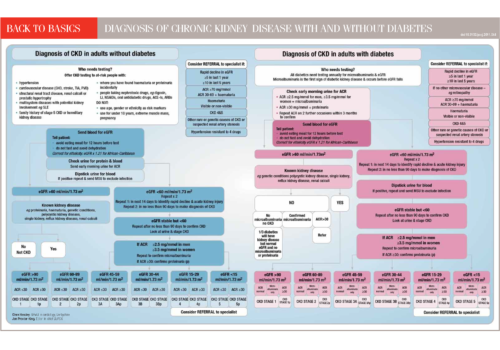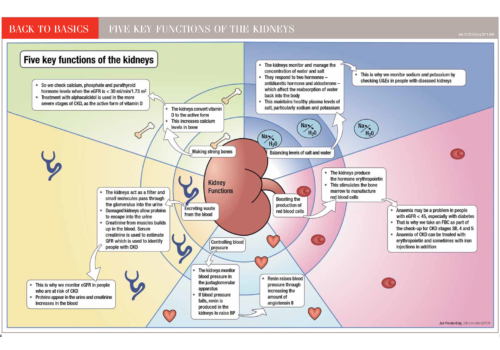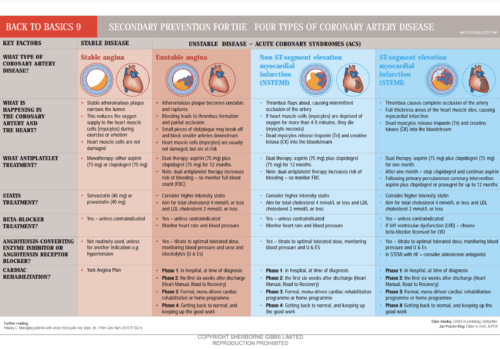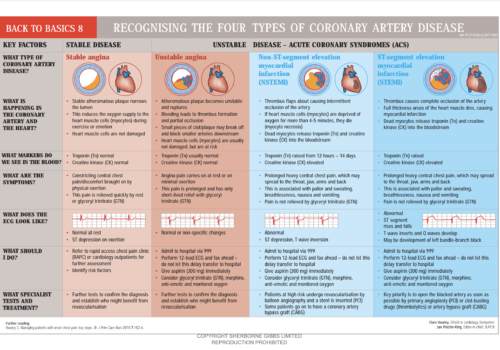Chronic kidney disease (CKD) has a high mortality rate once it reaches the most severe stage. However, complications can be reduced and even prevented if it is diagnosed and treated earlier. Many people who develop CKD become symptomatic only when the disease is well established. By that point, the opportunity for some of the interventions aimed at minimising the impact of the disease has passed. Nurses working in general practice are well placed to recognise people at risk for CKD, diagnose them early and ensure that treatment is initiated and optimised to protect their renal and cardiovascular health.
Back to Basics: Diagnosis of CKD with and without diabetes
Back to Basics: The five key functions of the kidneys
Eating well for your kidneys
Diet and lifestyle strategies are essential in the treatment and possibly in the prevention of chronic kidney disease (CKD). Dietary modification plays a fundamental role in helping to control increased levels of blood electrolytes and metabolic waste productsthat are often seen as renal function declines. Dietary and lifestyle modification may not directly influence disease progression in CKD, but several lifestyle factors have been highlighted as important due to the significant influence they exert over associated factors such as diabetes and hypertension, which are two of the leading causes of CKD, and obesity.
Using drugs safely in chronic kidney disease
Chronic kidney disease (CKD) affects renal drug elimination and other important processes involved in drug disposition, including absorption, drug distribution and non-renal clearance. As a result, the reduced renal excretion of a drug or its metabolites can cause toxicity and the sensitivity to some drugs is increased even if elimination is unimpaired.
Chronic kidney disease and QOF: Ticking the right boxes for the right reasons
The Quality and Outcomes Framework (QOF) was implemented in 2004 with the aim of ensuring that all patients had access to standardised, evidence-based care for their long-term condition. Points are awarded for meeting certain standards in each of theseconditions and the number of points earned is translated into money that is paid to the practice. Chronic kidney disease (CKD) is one of the long-term conditions with QOF points for registering and monitoring.
Proteinuria: Should it replace cholesterol as a marker for people at high risk of CVD?
We have all seen paintings of early physicians looking at flasks of urine to give an indication of a person’s health. And most of us can remember days of rows of urine pots lined up to test for new patients in primary care and in hospital outpatient clinics. We may assume that those days have gone in the era of blood testing and CT scans. So why are we suggesting that urine testing has a central role in finding patients with previously undiagnosed cardiovascular disease?
Making sense of chronic kidney disease
What exactly is chronic kidney disease (CKD), what causes it and how is it diagnosed? In this article we get down to the basics of defining what CKD is, and explore the stages of CKD. We review CKD progression and the assessment and management recommendations for each stage of CKD.
Chronic kidney disease management: Editorial 2
The effective management of long-term conditions such as chronic kidney disease (CKD) is probably the single greatest challenge faced by the NHS. The population is growing and people are living longer. Every week, the life expectancy for a newborn baby in the UK increases by more than 24 hours. While this is, in part, testament to the success of our health services, it also places steadily increasing demands upon them. As the population ages, the number of people living with long-term conditions is predicted to triple by 2050.
Chronic kidney disease: Editorial
Chronic kidney disease (CKD) has shot up the primary care agenda over the last few years, and is now well recognised as an independent risk factor for cardiovascular disease (CVD). At the same time, CVD is a risk factor for progression of CKD. The close links between CKD and CVD mean we have to get to grips with assessing patients’ kidney function and ensuring those with CKD receive the treatment needed to prevent progression. This special issue devoted to CKD is full of step-by-step guides and illustrated articles to help you get to grips with this important condition.
























